- Home
- Belva Plain
Heartwood Page 3
Heartwood Read online
Page 3
“Why don’t we see what’s going on when we get to your parents’ house? They’ll probably want us to stay with them for the entire time.” He looked down at the suitcases she’d been packing and the cake pan she was still holding. “I guess you’re going to have to put that thing in with our clothes,” he said. “Just make sure it doesn’t catch on my Irish sweater—okay?” And he walked out of the bedroom.
Laura sat on the bed. Suddenly her neck and shoulders ached from the hours she’d spent in the last week whipping egg whites for the tortes and her back was sore from bending over to pull them out of the oven. Because clearly, she and Robby weren’t even a little excited by … or even interested in … the prospect of spending a romantic night together. She rubbed her neck. When she’d talked on the phone to her mother earlier in the day, Iris had quoted what Nana had said about Laura; the words Laura had heard all her life. “You’ll never have to worry about that one.”
Well, Nana, you should see me now.
And then she wondered, How did we get here? In a few short years how did Robby and I get from our wedding day to this?
Chapter Three
Her wedding day. Laura and Robby had gotten married in 1970, that time of upheaval and rebellion for American kids, and they’d chosen to have a secular ceremony. It had been devastating to Iris, who was so religious, but Laura had been firm.
“It’s been years since Robby set foot inside the Methodist Church, Mom, and you know I haven’t been observant since I went away to college. I never really was, I’m more like Dad; I do the big holidays because it pleases you. It would be hypocritical for Robby and me to suddenly start with all the religious stuff now. Be happy that I’m getting married. Most of your friends’ daughters are just living with their boyfriends.”
Iris had accepted the inevitable but she hadn’t been happy about it. Laura, on the other hand, had loved her wedding day. She’d been married in the spring and she’d insisted on an outdoor ceremony because she wanted to have the whole sky above her when she committed herself forever to Robby, and she wanted the solid earth under her feet. Besides, everyone in her crowd agreed that if you were bothering to get married, doing it outside, usually in a park or on a beach, was the way to go. Laura had chosen her grandmother’s garden because it was the most beautiful place she knew. Nana was a fabulous gardener.
Robby had worn slacks and an open-necked shirt and Laura had felt dizzy with desire just looking at him. She had worn a white shift and she had braided her red hair and let it fall down her back. Robby had looked at her as if he couldn’t wait to be alone with her, which was crazy because they had been sleeping together for over a year. But the magic of their wedding day had made it seem logical—or whatever logic meant when you couldn’t see anyone in the world but a young man with soft brown eyes in an open-necked shirt. They had recited a poem by Emily Dickinson. It had been their favorite. They had shared favorite poems and books and songs back then.
So how did we get here? Laura asked herself as she sat on the bed she and Robby had been sharing for nine years of marriage. How did we get to a place where Robby resents it when I bake cakes to make extra money, and I resent him for complaining, and neither one of us really wants to be alone with the other in a hotel room for a weekend? We never admit that anything’s wrong, we don’t get angry—at least not out loud. But sometimes I think that would be easier than this … battle that seems to go on without us ever fighting. In the beginning I could finish his sentences and he could read my mind. When did that start to change? Laura laid back on the bed next to the partially packed suitcase and closed her eyes. Sometimes I feel there were signs of … “trouble” is too big a word … I’ll just say warning signs … from the very beginning, even before we were married. Has it been going on for that long? Sometimes I can’t help thinking so.
–—
When Robby and Laura decided to get married, she still had not met his mother and father. Her parents, to say nothing of Nana, were disturbed by this, but Laura told herself it was just because they were mired in dated ideas about family and old-fashioned rituals that she and her friends had thrown off. Robby was his own man, and she was her own woman, they were not bound by the prejudices, feelings or beliefs of their families. Meeting the relatives was simply not necessary when you were free-thinking adults of nineteen and twenty-two. But Nana had finally managed to convince Laura that the old-fashioned rituals had a purpose, even if it was just to soothe the fears of loved ones, so the McAllisters were invited to come east from their home in Blair’s Falls, Ohio, to meet the Sterns.
Robby had been sure his folks would refuse. “They never go anywhere,” he’d told Laura. But to his surprise they had accepted the invitation. Laura thought Robby seemed upset by this, but he insisted that he wasn’t.
Robby would be graduating the following spring, and he and Laura would be getting married three weeks after his graduation. Iris said it would be nice for the families to get together a few months before the wedding, so a weekend in late October was chosen for the visit. On the first night, Laura had cooked dinner, and after it was finished, Robby, Laura, Theo, Iris and Mr. and Mrs. McAllister—whose names were Frank and Emma Ann—retired to the Sterns’ front porch to sip coffee and try to get to know one another.
Physically, the McAllisters were a married version of Mutt and Jeff. He was small and wiry, without an ounce of fat on him; she was large and well padded. Frank McAllister’s face suggested a lifetime of bitterness, and Laura knew from Robby that he had failed in several businesses. Emma Ann was not an attractive woman and she didn’t do anything to help herself; her brown hair was pulled back in a bun, which made her full face look even fuller, and big round glasses hid the brown eyes that were so like her son’s and were her best feature. She wore the perpetually angry expression of a woman who felt life had passed her by.
They were the kind of married people who referred to each other as Mother and Father, and after Laura and Robby were married they wanted her to address them as Mother and Father McAllister. Laura was deeply grateful that her parents had simply asked Robby to call them Theo and Iris. She was also grateful that Robby didn’t have any brothers or sisters and that her brothers hadn’t been invited. The evening had been difficult enough with just the two sets of parents and Robby and Laura.
When Robby’s parents arrived, Laura was pretty sure that his father had been drinking. He wasn’t drunk, but she could smell liquor on his breath and Robby had thrown a worried glance to his mother, who had responded with a little shrug. Laura thought it was likely that they had been through this before, although Robby hadn’t ever said anything about his father drinking too much.
Dinner hadn’t gone very well; Laura had made her new specialty, coq au vin, and Mr. McAllister had announced that he didn’t have a stomach for foreign food. Given how many glasses of wine he had consumed during the meal, it couldn’t have been the alcohol in the dish that had bothered him.
“Father is a meat-and-potatoes man,” Mrs. McAllister had said with an apologetic little laugh. She seemed to be accustomed to apologizing for him.
Robby had told Laura that his mother’s family, and especially her brother, were prominent people in their small town. Mrs. McAllister had already regaled them over dinner with stories about the family department store, which was now being run by her brother. “Four generations of Landons have owned it,” she told her captive audience. “It’s a landmark in Blair’s Falls. But it took my brother, Donald, to put it on the map. It’s well known all the way to Cincinnati!”
At another point during dinner, she’d told them all that Robby was the apple of her eye. She’d actually said those very words in front of strangers. Laura had waited for Robby to try to stop her the way any of her three brothers would have done if her mother had been so gushy about them. But even though Robby had turned bright red, he hadn’t protested or even turned away. It had been his father who had snapped impatiently, “Oh for God’s sake, Mother, don’t make a foo
l of the boy!”
–—
Out on the porch, Robby’s parents were making no effort to extend themselves to the parents of the girl who was going to be their daughter-in-law. They sat side by side silently. It was left to Iris and Theo to try to make conversation.
“You must be so very proud of Robby,” Iris said. Her voice, which was usually lovely and well modulated, sounded edgy; she wasn’t at her best in awkward social situations. Mrs. McAllister pulled herself up proudly and gave them all a smug little smile. Mr. McAllister stared sullenly at Iris.
“Robby’s record, graduating third in his class, is certainly impressive,” Theo tried to help his wife.
“Archaeology is fascinating,” Iris said. In the fall Robby would begin studying for his doctorate in the field.
“I’m afraid it’s not a subject I’m familiar with,” Mrs. McAllister had suddenly decided to speak. “But my brother’s wife … her brother went to Yale, you know, so I trust him … he says that being asked to work on this dig in New Mexico is a feather in Robby’s cap.”
“From what I understand it is quite an honor,” Iris agreed eagerly. “Even I’ve heard of Professor Hawkins and his work, although like you, I’m not really knowledgeable about archaeology.”
Professor Hawkins, who would be mentoring Robby through the doctoral process, conducted an excavation site on a dig in New Mexico and he had invited Robby to be a part of his team. It was a very big honor indeed for Robby to have been singled out in a such a way at this phase of his education.
“I’ve been very lucky,” Robby started to say, but his father interrupted.
“He’s not going to be paid a thin dime,” he said. His speech was slightly slurred. “Making mud pies in the desert!”
Laura looked over at Robby. Any of her brothers would have defended himself if Theo had said something like that. But Robby’s face was blank, as if he hadn’t heard his father. Only his fists balled up in his lap gave him away.
“He says he’s going to get all this knowledge and experience,” Mr. McAllister went on. “Knowledge for what? That’s what I’d like to know. He’s going to go to school for another six years, he tells us. And then he’ll go dig up pieces of old pots and paste them together. A grown man playing with pieces of pots. After all the money that was spent on his education, and—”
“But my brother, Donald, is very pleased about Robby’s choice,” his wife cut in. “He was the one who sent Robby to college. Donald and his wife—she’s the one I mentioned a moment ago—don’t have any children. Robby’s like a son to Donald, and Donald is so proud of—”
“Donald! Donald! Donald!” her husband exploded. “No one gives a goddamn about your brother Donald.”
Under the porch lights, Laura saw Mrs. McAllister’s brown eyes fill with tears. Her round face crumpled with pain. It only took a second, then she regained control, blinked away the tears and forced herself to smile. But in that second Laura saw a history of humiliation that had probably been going on for years, and her heart ached for poor Mother McAllister.
Iris and Theo, meanwhile, were trying to cover the awkward moment with cheery offers of more coffee and another helping of the cake Laura had baked. The offers were rejected by Robby and his mother, who managed to end the evening quickly, and Robby drove his parents back to the hotel where they were staying.
After that, it had taken Laura a while to reassure her parents about her upcoming marriage. “You can’t judge Robby by his parents,” she said. “That’s not fair. You both love him. That hasn’t changed. Besides, maybe tomorrow night things will be better.”
It did seem as if the second evening started out better. Mr. McAllister was completely sober, for one thing, and Mrs. McAllister was making more of an effort to be friendly. This time they had dinner in the dining room of the hotel where the McAllisters were staying, and everyone seemed to be getting along, until the coffee was served. Then Theo announced that he had a practical matter he wanted to discuss.
“Iris and I wish to pay for an apartment for Laura and Robby to live in, as well as Laura’s tuition,” he told his prospective in-laws. “Just until Laura graduates from college. Then she can get a job to carry expenses until Robby has his doctorate.”
“After all, we’d be paying for her room at the dorm if she hadn’t transferred to be with Robby,” Iris had added.
Frank McAllister put down his coffee cup. “I believe if a man is ready to get married he should be ready to stand on his own two feet. I don’t see any reason to coddle my son the way you’re suggesting.”
And besides, you couldn’t afford it, Laura thought angrily. She saw that once again, Robby was looking off with a blank expression as if he hadn’t heard his father.
“But Laura and Robby won’t be in a position to support themselves for a while,” Iris protested. “At least, they won’t be able to do it without tremendous hardship.”
“We want them to concentrate on their studies, not trying to pay their rent,” Theo put in. “I don’t call that coddling. We expect them to work hard and do well. We just want to ease the way for them a little.”
“After all, they have a long haul ahead of them,” Iris said eagerly. “Laura still has three more years until she graduates from college and I know myself how long it can take to get a doctorate.”
“Then perhaps Laura could put her own ambitions on hold and support her husband,” Mrs. McAllister put in. “Plenty of women have done that—and without complaining about it.”
For a second, Laura wasn’t sure she’d heard the woman correctly. Then she looked at both of Robby’s parents and realized with a shock that this was what they expected of her. And Robby had never told them differently.
“I plan to work while Robby’s studying for his doctorate,” she said angrily. “And I promise I won’t complain.”
And I can’t imagine why I ever felt sorry for you, Mrs. McAllister. You deserve your horrid husband.
“With a college degree Laura can earn more money,” Iris said, even though she and Theo never would have thought of education in terms of dollars and cents.
“Well, all I know is, I quit school and went to work as a file clerk when Father and I got married,” Mrs. McAllister said. “It wasn’t an exciting job, or intellectually stimulating, but we needed my paycheck, and it was the best I could do. I don’t remember anyone ever saying I had to go to college or have someone pay my way while I did it.”
“But Laura’s mother and I do say she must go to college,” Theo snapped. And Laura could tell how furious he was, because his slight accent had suddenly become more pronounced, and his aristocratic face had taken on the expression that Laura and her brothers used to call “snooty” when they were young. “Laura will have the same education we have given our sons. And the same assistance.”
It was going to get ugly—even more than it had last night. Mr. McAllister was now glaring at Dad, and Mrs. McAllister was taking in deep, angry breaths, and Dad was looking at both of them like they were something disgusting he’d found on the bottom of his shoe. If either of them said anything else Dad was going to let them know exactly how stupid and ignorant they were. And in spite of how much Laura felt she’d enjoy that, she knew it would devastate Robby. Plus, she wanted both families to be on speaking terms for the wedding. She was going to have to do something.
“Mom and Dad, don’t worry about us,” she said. “Robby and I will both get jobs. We won’t need any help.”
And no matter how hard her parents protested for the rest of the evening, and in the coming days, she was adamant. After all, she was helping Robby save face—she was sure Nana would have done the same thing for her husband.
–—
If she had expected Robby to be grateful to her for giving up the financial assistance that, frankly, she’d been counting on, she was wrong. He didn’t say a word about those two terrible nights until they were safely back on their campus and in bed in his room at the dorm. He stared up at the ceiling, no
t touching her.
“So now you know,” he said. “My dad drinks, not all the time, but too much. I’ve never been sure if that was why all his businesses failed or if he started drinking because he was a failure.”
“It doesn’t matter, it has nothing to do with you,” she said fiercely.
It seemed to be what he needed to hear, because he put his arm around her. But he was still troubled. “Try not to judge my mom, okay?”
“It seemed to me that she was the one doing the judging.”
He sighed. “You don’t know what her life has been like.”
“She seems to think it was ideal. Or, at least, she was ideal.”
“No. She knows better. That’s why she … oh, you’ll never understand.” He pulled his arm out from under her and stared at the ceiling again.
“Try me,” she said more gently.
“You had it all when you were growing up. A home full of culture and class … and your mother had the same kind of life before you. You’ve told me her father treated her like a queen. No one felt that way about Mom. My Uncle Donald was good-looking and smart—and he was the boy. She was just the girl. I know she brags too much. It makes me cringe when she tries to find a way to quote my Aunt Margaret’s brother because she wants everyone to know she’s related to someone who went to Yale. It’s so damn sad!
“Your father is proud of your mother for getting her doctorate. I can see it whenever he talks about the work she does. My father would never be proud of anything my mother did. I’ve never seen him be tender or gentle with her. Not once. I’ve never heard him thank her for all the years she spent at that lousy job supporting us while he was screwing up business after business, until my Uncle Donald finally took pity on her and gave her an allowance. And now my father resents her for that.

 The Golden Cup
The Golden Cup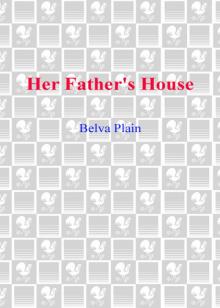 Her Father's House
Her Father's House Whispers
Whispers Crescent City
Crescent City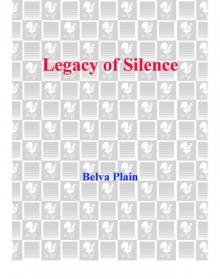 Legacy of Silence
Legacy of Silence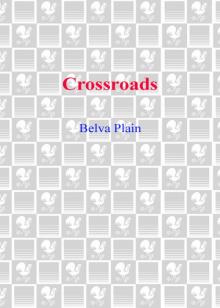 Crossroads
Crossroads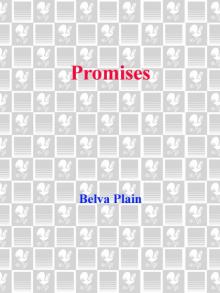 Promises
Promises After the Fire
After the Fire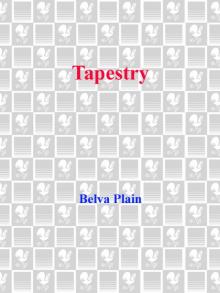 Tapestry
Tapestry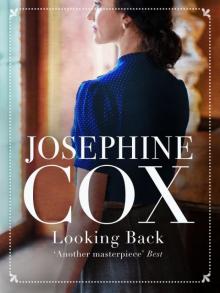 Looking Back
Looking Back Heartwood
Heartwood The Carousel
The Carousel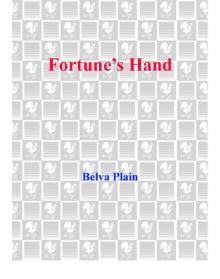 Fortune's Hand
Fortune's Hand Homecoming
Homecoming Random Winds
Random Winds Harvest
Harvest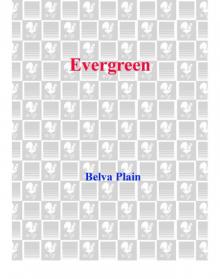 Evergreen
Evergreen Treasures
Treasures The Sight of the Stars
The Sight of the Stars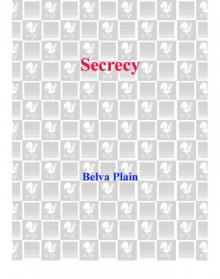 Secrecy
Secrecy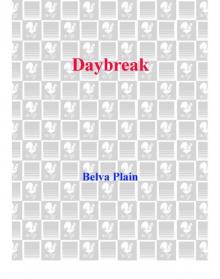 Daybreak
Daybreak Eden Burning
Eden Burning